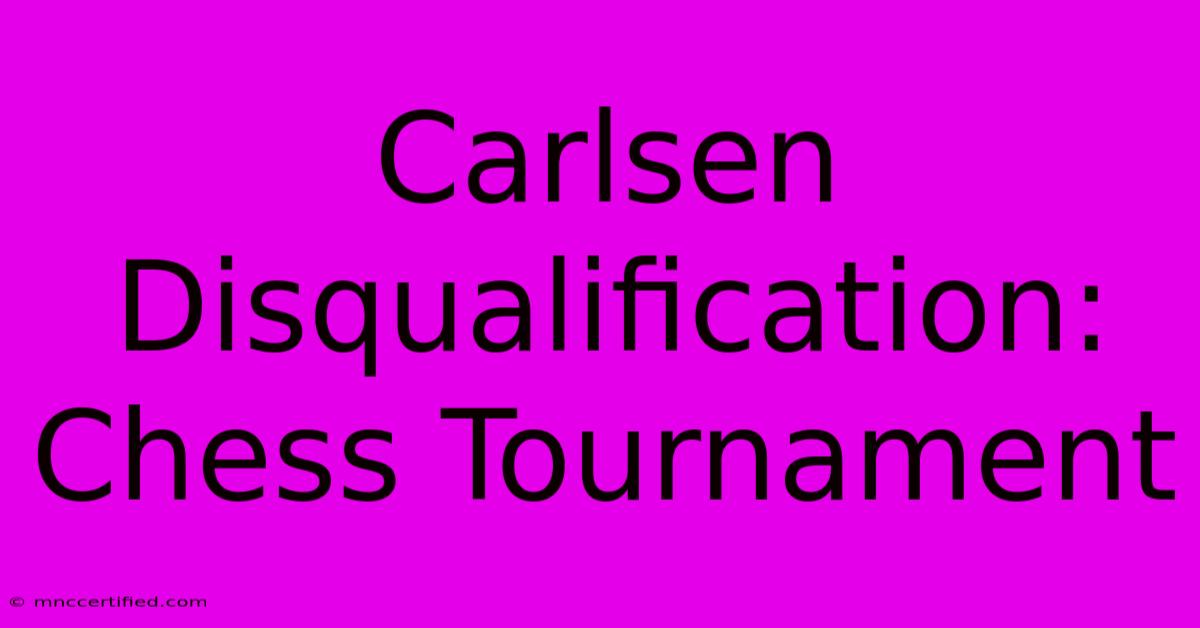Carlsen Disqualification: Chess Tournament

Table of Contents
Carlsen Disqualification: A Shocking Turn of Events in the Chess World
The chess world was sent into a frenzy recently with the unexpected disqualification of Magnus Carlsen, the reigning world champion, from a major tournament. This unprecedented event sparked intense debate and speculation, raising questions about sportsmanship, fair play, and the future of competitive chess. This article delves into the details surrounding Carlsen's disqualification, exploring the controversy and its implications.
The Incident: What Happened?
While the specifics surrounding the disqualification remain somewhat shrouded in mystery (official statements often lack detail, intentionally or otherwise), the core issue revolves around Carlsen's alleged violation of tournament rules. The exact nature of the violation hasn't been publicly disclosed in full by the organizers. This lack of transparency has fueled much of the speculation and online discussions. Some reports suggest it involved the use of unauthorized electronic devices or assistance, others point towards breaches of conduct relating to fair play and respect for opponents. Whatever the reason, the consequences were severe.
The Aftermath: Public Reaction and Debate
The announcement of Carlsen's disqualification immediately ignited a firestorm of reactions across social media and chess forums. Many fans expressed their disbelief and anger, questioning the fairness of the decision and demanding more transparency from the tournament organizers. The lack of clear communication fueled further speculation and conspiracy theories. Some even suggested that the ruling was politically motivated, given Carlsen's stature and influence within the chess community.
#CarlsenDisqualification quickly became a trending hashtag, reflecting the intense global interest in the unfolding drama. Leading chess commentators and personalities weighed in with their analyses and opinions, further stoking the debate. The incident highlighted the potential impact of even minor rule infringements on high-profile players and the scrutiny they face.
Analyzing the Implications: Fair Play and the Future of Chess
The Carlsen disqualification carries significant implications for the future of competitive chess. It raises important questions about:
- Transparency in tournament rules and regulations: The lack of clarity surrounding the violation has raised concerns about the need for clearer, more accessible rules.
- Enforcement of rules and fairness: The swift and severe punishment raises questions about consistency in applying tournament regulations across all players.
- The use of technology in chess competitions: The possibility of technological assistance, even unintentionally, highlights the ongoing challenges of maintaining fair play in a technologically advanced world.
- The impact on the sport's image: The controversy undoubtedly damaged the sport's image, even if only temporarily, potentially impacting sponsorships and fan engagement.
Lessons Learned and Moving Forward
While the specifics of Carlsen's case remain unclear, the incident serves as a crucial reminder of the importance of:
- Strict adherence to tournament rules and regulations: Players must be acutely aware of the rules and their consequences.
- Maintaining ethical conduct and sportsmanship: Respect for opponents and upholding the integrity of the game are paramount.
- Promoting transparency and clear communication: Tournament organizers must ensure clear communication regarding rules, violations, and penalties.
The Carlsen disqualification represents a significant moment in the history of chess. Its lasting impact remains to be seen, but it will undoubtedly influence future tournament regulations, player conduct, and the broader discussion of fair play in competitive chess. The incident underscores the need for greater transparency and a commitment to ensuring that the integrity of the game remains paramount.

Thank you for visiting our website wich cover about Carlsen Disqualification: Chess Tournament. We hope the information provided has been useful to you. Feel free to contact us if you have any questions or need further assistance. See you next time and dont miss to bookmark.
Featured Posts
-
Scheffler Injured Christmas Dinner Incident
Dec 29, 2024
-
Judi Denchs Heartfelt Tribute At 90
Dec 29, 2024
-
Bruins Snap Gonzaga Losing Streak
Dec 29, 2024
-
Suns Mavs Game Nurkic Marshall Suspensions
Dec 29, 2024
-
Reddys Familys Heartfelt Reaction
Dec 29, 2024